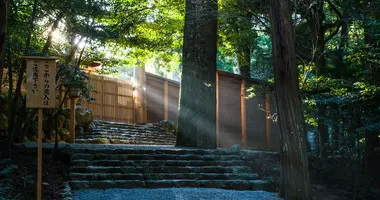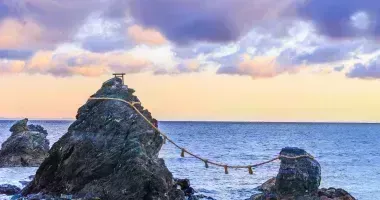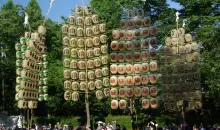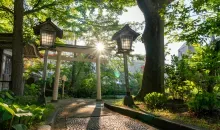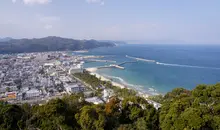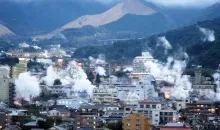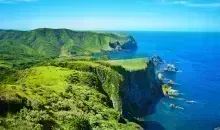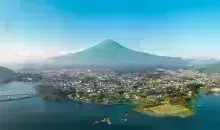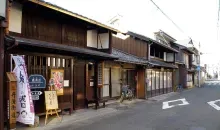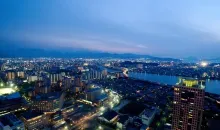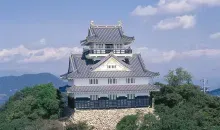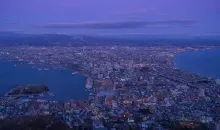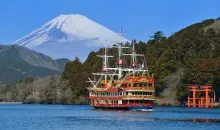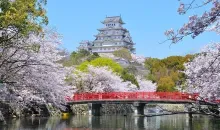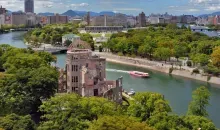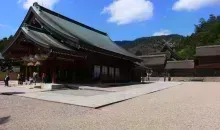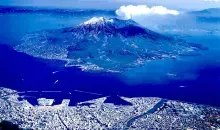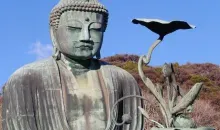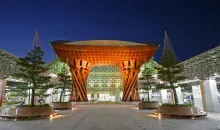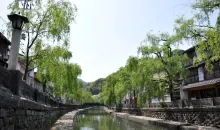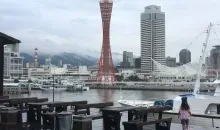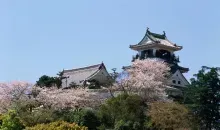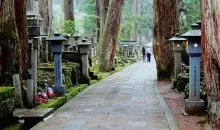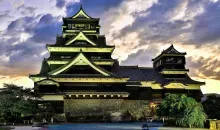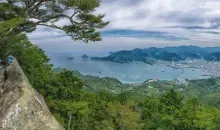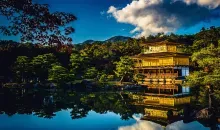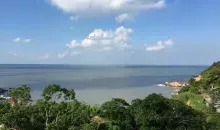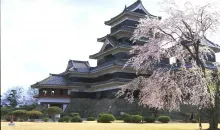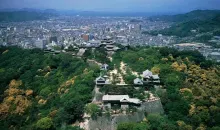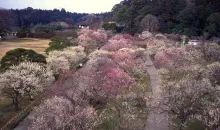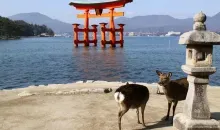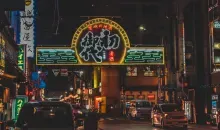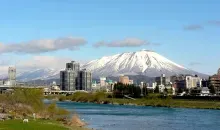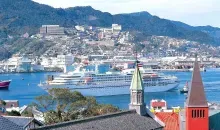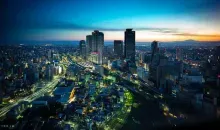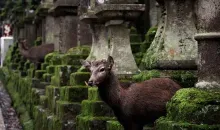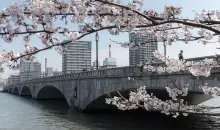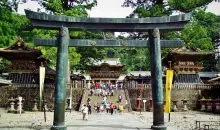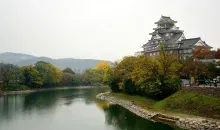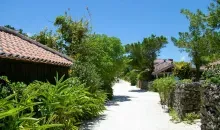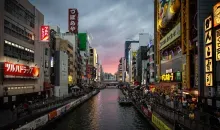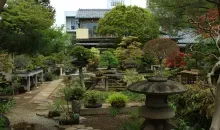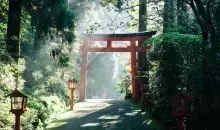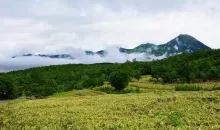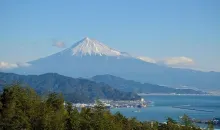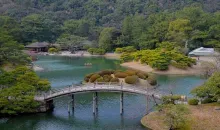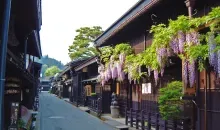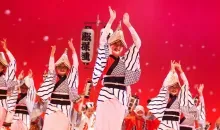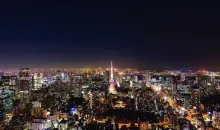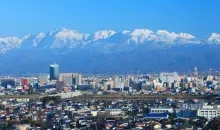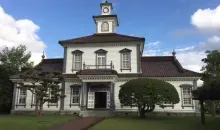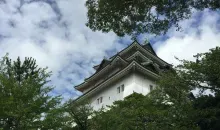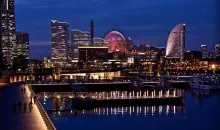Ise
Discovering Japan's most sacred city
Found in the middle of Mie Prefecture, the city of Ise radiates a mysterious aura from the Kii Peninsula. The cradle of the sun goddess Amaterasu, this town is home to Ise-Jingu, the holiest sanctuary in all of Japan. Ise is also a major cultural town in the region, and with its history and geography, it welcomes thousands of visitors a year, eager to unravel all its mysteries. This is a region that can boast some of the best that Japan has to offer: historic spiritualism, beautiful scenery, incredible food, and reputable artisanal crafts. In fact, the latter has been acknowledged by UNESCO, which dubbed Ise as a “City of Craft and Folk Art” in 2008.
The combination of each of these factors makes the city and surrounding region as a whole one that’s brimming with culture and places to discover. Take a more in-depth look at what Ise has to offer!
The birthplace of the goddess Amaterasu
Perhaps the most well-established attraction in Ise City is the famous Ise-Jingu Shrine. Arguably the most significant Shinto grand shrine in all of Japan, it was initially erected in honor of Amaterasu, the sun goddess attached to the imperial family, all the way back in the year 4 B.C.E. The religious complex consists of 125 smaller shrines and is said to be "the soul of Japan."
Go through the Uji Bridge to access the Naiku Shrine, the birthplace of the goddess Amaterasu. Ancient visitors believed its wooden construction would wash away their sins from those who pass through it.
The most prized shrine in the country, the Naiku is said to house the yatano kagami mirror, one of the three sacred relics of Japan, and was used to bring Amaterasu out of the cave in which she had been hiding following a violent argument with her brother Susanoo, the god of storms.
As it is a place of admiration, don't be surprised that most buildings are closed to the public. Like the Naiku Shrine, accessible only to the Emperor and a few elder statesmen Shinto priests. The exteriors of the site offer a pleasant view for a walk in the heart of the city, and many events take place throughout the year in the enclosure of Ise-jingu. Like the Kagura, sacred dances are performed in honor of pilgrims to protect them.
Don't forget to visit the Sengukan Museum nearby. Accessible to all, it holds the secrets of more than 1000 years of preservation!
While the Naiku is the main inner shrine of Ise-Jingu, the outer shrine is known as the “Geku.” Up to the Geku is a special shopping street with great spots for souvenirs and other goods. Exploring the Geku entails a leisurely stroll around the shrine paths. Relax and take in the rich nature and spirituality of Ise Jingu. Going to the nearest station is easily done by foot, taxi, or local bus. Don't forget to visit the Sengukan Museum, nearby, which presents extensive information about the shrine, its history, and practices.
The nature-rich lands of Ise
Enveloping much of the land around the city and central Ise-Jingu Grand Shrine are the lush forests of Ise. About 5,500 hectares of forest make up the grounds of the surrounding area, about a whole third of the city’s total landmass. In fact, the previously mentioned Naiku and Geku are situated within the pristine forests. The prefecture of Mie as a whole has a rich history of forestry and woodcraft derived from its surroundings.
Ise is also famous for its rich coastal scenery, which can be seen at Ise Bay. The bay is well-seen from observation locations nearby the city. The waters around Ise have also been instrumental to the development of the area, presenting a bounty of delicious fish and seafood, rich land for rice crops, and industries such as pearl-farming. Bear witness to the gorgeous waters that define Ise City and the Kii Peninsula. There are even ferries that provide on-water tours for visitors to see the natural beauty of the bay.
One of the other crown jewels for scenery in Ise, however, is Mount Asamagatake, elevated above the city and presenting an all-encompassing view of the region. The previously mentioned rich forests and glistening blue waters become one giant landscape from the mountain, which is a popular hiking destination. Historically, the ascent up the mountain was done by pilgrims prior to visiting Ise Jingu. The total journey up and down Mount Asamagatake takes around 4-5 hours.
A city built on artisanal craft
As a UNESCO-recognized city, the culture of traditional artisanal crafts is almost unparalleled in Ise. These crafts span from local specialties to world-recognized luxury items.
Ise City is a treasure trove for those looking for unique crafts utilizing traditional techniques, often made in small numbers and meticulously made by hand.
As previously mentioned, the rich woods of the area have provided Ise with quality lumber to be used for woodworking. A signature of the area is “Ise Shunkei,” the form of lacquerware that is created in the area. Traditionally made with local cypress wood (known as hinoki in Japanese), Ise Shunkei is notable for its rich color and high quality and is simultaneously intended to be used on an everyday basis. As the lacquerware is consistently used throughout the years, it develops a one-of-a-kind patina.
Another storied woodworking craft in Ise is that of Itto-obori sculpting. This is a form of sculpting that is chiseled by hand, derived from the city’s roots, and developed by shrine carpenters who would restore Ise Jingu once every 20 years throughout the centuries. Smaller crafts serve as great souvenirs for the goods, often used as home decor.
Likely the most internationally recognized craft to come out of Ise is that of pearls, as the farm cultivation of pearls originated here by Koichi Mikimoto at the end of the 19th century. Mikimoto is a name many may recognize, as it is the most reputable name in luxury pearl jewelry. The original island that the cultivation process was developed on stands as an attraction, complete with a dedicated museum. Pearls here were initially gathered by the aforementioned ama divers, whose work set the foundation for Mikimoto’s farming process. Fashion and jewelry enthusiasts ought to visit the island and commemorate the genesis of one of the most recognized names in the industry and see the continued art of pearl cultivation in action.
The culinary specialties of Ise
Rich in its spirituality, Ise is also famed for its food. At the heart of the city, the traditional Oharai-machi area extends over more than one kilometer. With wooden houses and architecture from Edo (1603–1868), the district bordered by the Isuzu River, offers a glimpse of common country lifestyle, a page out of the history book, to a time when pilgrims roamed the alleys of Ise-jingu.
Within it, the Okage-Yokocho shopping street allows you to discover local specialties. Udon, Matsusaka beef, or abalone caught by the ama divers of the neighboring town—countless restaurants in the area have been cooking up great recipes for centuries.
The latter, especially, is a worthwhile experience, as ama are historic, all-female divers who practice a form of free-diving done with no breathing apparatus equipment. Though the practice is not as commonplace as it once was, its spirit is maintained for visitors to the prefecture. It’s the perfect way to try Ise’s fresh seafood while also engaging with traditional Japanese practices.
Also, be sure to try the famous Ise-ebi, a local delicacy so heavily associated with the area that it shares a name. In English, Ise-ebi is known as Japanese Spicy Lobster and is famous for its distinct look as well as its luxuriously rich and sweet meat, often served both cooked and raw as sashimi or tartare.
Additionally, Ise is the third-largest tea producer in the country, where tea and wagashi are favorite snacks. Akafuku, a mochi stuffed with red bean paste, was invented in one of the city's tea houses in the 18th century.
In addition to its restaurants, cafes, and stalls, Okage-Yokocho has many souvenir shops. Homemade honey, pottery, and lucky charms highlight the craftsmanship of Ise!
During the first of the month, Tsuitachi Mairi (the first monthly pilgrimage), stores open very early to offer new things to the brave who come to Oharai-machi after their return from Ise-jingu.
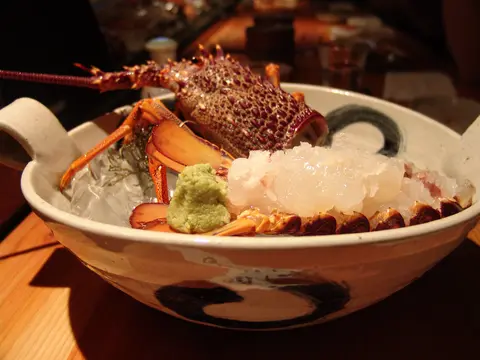
Ise-ebi
takaokun on Flickr, CC BY 2.0
The best places to eat in Ise
Akafuku Honten : Akafuku specialist
Address : 26 Ujinakanokiri-cho, Ise-shi, Mie-ken
Hours: from 5 a.m. to 5 p.m.
Ebiya: in abalone for several generations
Address: 13 Ujiimazaike-cho, Ise-shi, Mie-ken
Hours: 9 a.m. to 5 p.m.
Oiseya Honpo: famous for Matsusaka beef
Address: 94-7 Ujinakanokiri-cho, Ise-shi, Mie-ken
Hours: 10 a.m. to 5 p.m. (be careful, the hours change regularly)
Iseman Naiku Mae Japanese Sake Factory: the only distillery in Ise, you can find amazake, yuzu sake, and plum sake.
Address : Okage Yokocho, 77-2 Ujinakanokiri-cho, Ise-shi, Mie-ken
Hours: 9:30 a.m. to 5:30 p.m. (times may vary regularly)
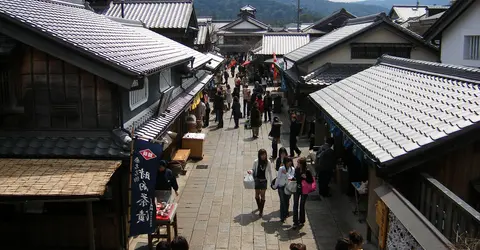
Une des rues du quartier d'Okage Yokocho
Wikipedia
Futami Onsen: Relaxation amongst natural beauty
Futami Onsen is a premier destination in Ise, home to some of the most amazing scenery in all of Japan, centered around warm and relaxing onsen hot springs with luxurious accommodations.
The most famous landmark at Futami is Meoto Iwa, or “the wedded rocks.” The two holy stones are connected by a rope structure known as a shimenawa. The two rocks represent the connection between two of Shinto’s most significant deities: Izanami and Izanagi, the mother and father of Japan within the Shinto mythos. On clear mornings, the sun can be seen rising between the two rocks, encompassing much of the most emblematic features of the Japanese archipelago into one scene. The beaches in the area are also lauded, making them popular with both those who wish to take the time to relax and those who wish to indulge in nature.
Futami Onsen is one of the most significant locations regarding Japan’s traditional spirituality and history, and being able to witness such while indulging in top-tier comfort and accommodation makes it one of the most eclectic destinations in all of Japan.
Shima Peninsula places to visit near Ise
The south of the peninsula is remote, tranquil, and more photogenic, as the picturesque jagged coasts offer a superb panoramic view of the 60 islands of Ago Bay and the pearl fishing boats, while Goza is a small fishing port, a stone's throw from a wide white sandy beach (Goza-shirahama).
See more of Ise and Shima Peninsula below:
Interested by Ise
Discover other cities to explore







